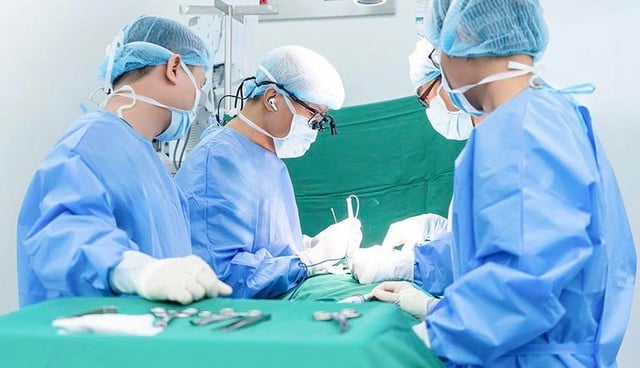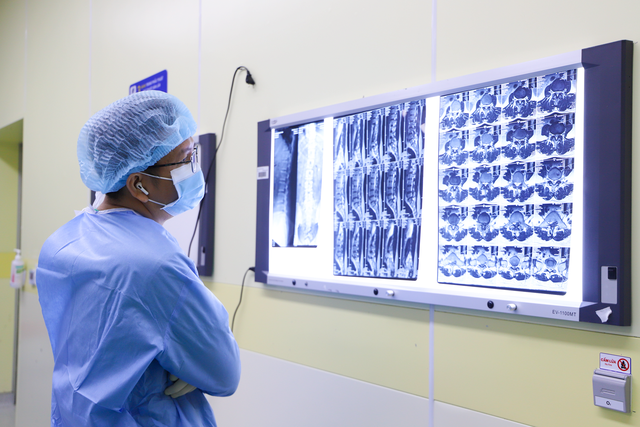Specialist Doctor Nguyen Hai Tam, Department of Neurosurgery - Spine, Nam Sai Gon International General Hospital replied: Endoscopic spine surgery is a modern, minimally invasive method, increasingly widely applied in the treatment of herniated discs , especially in cases that no longer respond to medical treatment. This is a technique that uses a specialized endoscope with a very small skin incision (less than 2 cm) and is supported by images under a modern C-arm system, helping to accurately access the damaged disc to remove the nucleus pulposus compressing the nerve root, while minimizing damage to surrounding tissues.
The special feature of this method is that the incision is small, the patient has less pain after surgery, recovers quickly, and can Travel within 1-2 days, very suitable for the elderly or those with underlying medical conditions such as high blood pressure or diabetes.

Endoscopic spine surgery, treatment of herniated disc at Nam Sai Gon International General Hospital
PHOTO: TH
Not everyone with a herniated disc can have endoscopic surgery.
Dr. Tam said that not everyone with a herniated disc can have endoscopic surgery. A specialist will prescribe endoscopic spine surgery in the following cases:
- Herniated disc causes obvious nerve root compression on MRI , manifested by pain radiating along the nerve path, causing numbness or weakness in the limbs.
- Long-term medical treatment is ineffective : The patient has been treated with medication, physical therapy, and proper rest for many months but has not improved, or the back pain symptoms have progressed to become more severe.
- There are no major contraindications to surgery such as : Patients with severe blood clotting disorders, uncontrolled infections... Most common underlying diseases can still be operated on, if they are controlled and stabilized before surgery, such as stopping anticoagulant medication before surgery...
- Moderate disc injury : No serious complications such as spinal instability due to large spondylolisthesis (grade 3 and 4) or multi-level spinal stenosis.
Spinal endoscopy not only helps remove herniated discs and reduce nerve compression, but also helps patients return to daily activities sooner, reducing the risk of complications.

Doctor analyzes MRI of spine
PHOTO: TH
If your mother has had a herniated disc for many years, and now has increased pain, leg numbness, and difficulty walking, it is necessary to see a spinal specialist as soon as possible to assess the extent of the damage.
After a clinical examination and imaging tests such as MRI, the doctor will assess the specific condition to decide on the appropriate method. If your mother has a simple herniated disc without any complications, endoscopic surgery may still be an effective option.
However, if the results show that in addition to disc herniation, your mother also has multi-level spinal stenosis, spinal instability due to severe degeneration, grade 3-4 spondylolisthesis or vertebral collapse, the doctor may consider other intervention methods such as open surgery or percutaneous screw fixation combined with interbody bone grafting - to ensure effective treatment and post-operative recovery.
Source: https://thanhnien.vn/alo-bac-si-nghe-phau-thuat-noi-soi-cot-song-co-tri-duoc-thoat-vi-dia-dem-185250710155717908.htm


































































































Comment (0)